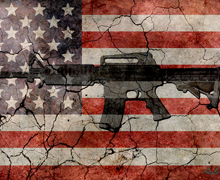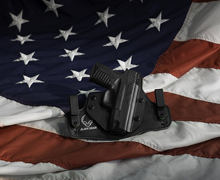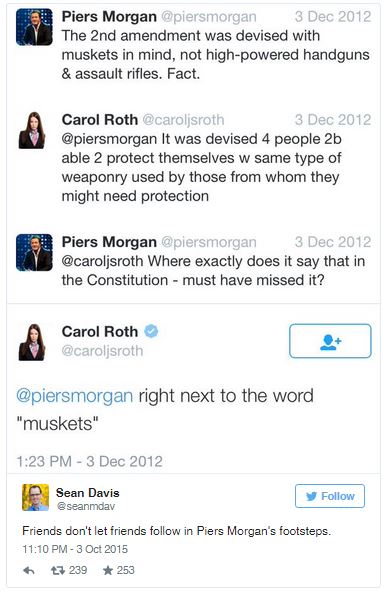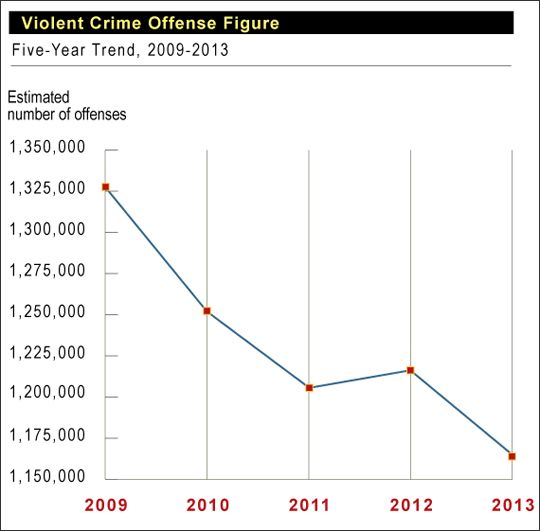By Sean Davis | The debate over gun control and gun rights would be more productive if both sides focused on the facts instead of pushing myths about America’s gun laws.
After every shooting, politicians and activists rush to the cameras or their keyboards to tell people exactly what should be done to stop mass shootings in the future. Gun control proponents demand more gun control. Gun rights advocates dig in their heels and explain why new laws won’t stop evil people from doing evil things, especially when current laws aren’t adequately enforced.
Unfortunately, the debate between the two sides is rarely illuminating, as it usually devolves into tired recitations of worn-out talking points about the issue. These talking points are invariably littered with myths and factual inaccuracies. Here are 7 myths about gun control that just won’t die.
1) The ‘Gun Show Loophole’ Allows Anyone, Even Criminals, To Get Guns
In reality, the so-called “gun show loophole” is a myth. It does not exist. There is no loophole in federal law that specifically exempts gun show transactions from any other laws normally applied to gun sales. Not one.
If you purchase a firearm from a federal firearms licensee (FFL) regardless of the location of the transaction — a gun store, a gun show, a gun dealer’s car trunk, etc. — that FFL must confirm that you are legally allowed to purchase that gun. That means the FFL must either run a background check on you via the federal NICS database, or confirm that you have passed a background check by examining your state-issued concealed carry permit or your government-issued purchase permit. There are zero exceptions to this federal requirement.
If an individual purchases a gun across state lines — from an individual or FFL which resides in a different state than the buyer — the buyer must undergo a background check, and the sale must be processed by an FFL in the buyer’s home state.
What does exist, however, is a federal exemption for sales between two private, non-FFL residents of the same state, regardless of whether that transaction happens at a gun show or not. The identity of the parties involved in the transaction, not the venue of the sale, is what matters under federal law. This federal exemption makes perfect sense: there’s no federal nexus for a purely private transaction between two private individuals who reside in the same state. Many states, including Oregon, Colorado, and Illinois, have enacted universal background checks in order to eliminate the exemption for same-state private firearms transactions.
Federal universal background checks may or may not be a wise idea — the U.S. Senate in 2013 explicitly refused to enact them — but referring to the federal exemption for private, same-state sales as a “gun show loophole” is misleading and factually inaccurate.
2) Nobody’s Demanding Gun Confiscation
We’ve all seen how this one plays out. In the wake of a shooting, a politician demands “common sense gun regulations.” Gun rights supporters then respond with something along the lines of, “He just wants to take our guns!” That criticism is then followed by mockery from various corners of progressive blogdom that no, you stupid hick, nobody wants to take your guns.
But that’s not true. A number of progressives do actually want to take your guns.
TPM’s Josh Marshall finally admitted earlier this week that progressives care a whole lot more about gun confiscation than they do about nibbling around the edges of existing gun laws.
“In other words, yes, we really do want to take your guns,” he wrote. “Maybe not all of them. But a lot of them.”
He’s not the only one. There’s also E.J. Dionne at the Washington Post, who scolded Republicans for refusing to endorse a nationwide gun confiscation program similar to one instituted in Australia in the mid-1990’s.
It’s not just leftist bloggers pushing for gun confiscation, though.
Take the president of the United States, for example. After the shooting at Umpqua Community College in Oregon, President Barack Obama made a statement that “we should politicize” shootings. He then cited radical gun confiscation laws in Australia and Great Britain as examples that the U.S. should follow:
We know that other countries, in response to one mass shooting, have been able to craft laws that almost eliminate mass shootings. Friends of ours, allies of ours — Great Britain, Australia, countries like ours. So we know there are ways to prevent it.
The intent of Obama’s reference to Australia’s nationwide gun confiscation law, its ineffectiveness notwithstanding, couldn’t have been more clear. Yes, they really do want to take your guns.
3) Buying A Gun Is As Easy As Buying Groceries
Last March, President Barack Obama was asked about guns during a press conference, and he responded by saying, “It’s easier for you to buy a handgun and clips than it is for you to buy a fresh vegetable.” Ignoring for the moment that the president does not understand the difference between a clip and a magazine, his claim is not true.
It is not easier to buy a gun than it is to buy a fresh vegetable, or any canned vegetable for that matter. Never in my life have I been required to fill out federal form 4473 and have the cashier run a background check on me before being allowed to buy an onion.
There are no federal laws requiring onion dealers to register with the federal government prior to selling onions. There are no state laws requiring that you apply for and receive an onion purchase permit, complete with background check, prior to purchasing an onion. There are no onion waiting periods or limits on how many onions you can purchase within a certain period of time. Nor are there, to my knowledge, any state or local laws prohibiting the possession of onions in schools or government buildings.
Firearm manufacturing and sales are highly regulated by the federal government. Numerous complicated laws govern virtually every aspect of the process. Anyone who has purchased a gun before can you tell you in great detail that it is not as easy as buying a vegetable at a grocery store. It is an expensive and time-consuming process.
Some people may think gun control is a great idea and that it should be harder to buy a gun than it currently is, but they should refrain from suggesting that legally purchasing a firearm is easier, cheaper, and less time-consuming than buying a carrot. Because it’s not.
4) Concealed Carriers Don’t Prevent Mass Shootings
“Do armed civilians stop mass shooters?” the liberal magazine Mother Jones asked in 2012. “Actually, no.”
Mother Jones justified its assertion by citing its own analysis that of the 62 mass shootings between 1982 and 2012, not one was stopped by a civilian with a gun. Shocking, right? Not really, once you consider the logical fallacy underlying the Mother Jones claim.
The fact of the matter is that shootings that happen in an area where concealed carriers can immediately respond don’t generally become mass shootings. It’s a bit like saying locked doors and alarms don’t prevent burglaries by only citing burglaries that happened in buildings with no locked doors or alarms as proof of your thesis. It’s no coincidence that so many mass shootings happen in areas declared to be “gun-free zones” by authorities.
Instances of concealed carriers stopping shooters in their tracks are too numerous to count. Here are just a few examples found from a few seconds of Googling.
A 62-year-old man with a gun in each hand fired at four people – including a 1-year-old boy – before a civilian with a concealed carry permit returned fire and wounded the shooter, cops told FOX19.
Authorities say no charges will be filed against an Uber driver who shot and wounded a gunman who opened fire on a crowd of people in Logan Square over the weekend.
The driver had a concealed-carry permit and acted in the defense of himself and others, Assistant State’s Attorney Barry Quinn said in court Sunday.
A group of people had been walking in front of the driver around 11:50 p.m. Friday in the 2900 block of North Milwaukee Avenue when Everardo Custodio, 22, began firing into the crowd, Quinn said.
The driver pulled out a handgun and fired six shots at Custodio, hitting him several times, according to court records. Responding officers found Custodio lying on the ground, bleeding, Quinn said. No other injuries were reported.
A 63-year-old autoworker with a concealed weapons license shot a gunman who was robbing a Warren, Michigan, bank, according to Fox 2 Detroit.
Concealed carriers can’t be expected to stop every shooting, just as police can’t be expected to prevent all crime. It is a fact, though, that concealed carriers regularly put an end to violent shootings.
5) The Second Amendment Only Applies To Muskets
This trope is a popular one among gun control advocates who imagine themselves as strict constructionists when it comes to Constitutional interpretation. Piers Morgan, the failed CNN host and British tabloid editor accused of hacking into celebrity voicemails in search of tabloid gossip, is the foremost advocate of the notion that the Second Amendment protects only the rights of Americans to carry muskets:
As Carol Roth noted, the refusal of the Founding Fathers to precisely name the types of arms which citizens have a right to keep and bear was intentional. The same can be said of their refusal to constrain our right of free expression to quill pens and bulky printing presses. The Second Amendment protects our right to own handguns just like the First Amendment protects our right to criticize the government using the Internet.
Both the text of the Second Amendment and the intent behind it are clear: the right of the people to keep and bear arms shall not be infringed. Law-abiding citizens have the right not only to own weapons, but to carry them as well. The Second Amendment isn’t about muskets or bayonets. It’s about the right of a free people to defend themselves with arms if necessary.
6) Gun Violence Is Skyrocketing
If you’ve spent any time on social media, you’ve seen the lamentations: gun violence is skyrocketing. It is an epidemic. Constant TV coverage of shootings can certainly make it seem that way. But the truth of the matter is that gun violence is actually way down. It hasn’t skyrocketed; it’s plummeted.
A 2013 study from the Pew Research Center found that gun violence had fallen by nearly 50 percent since its 1993 peak:
Compared with 1993, the peak of U.S. gun homicides, the firearm homicide rate was 49% lower in 2010, and there were fewer deaths, even though the nation’s population grew. The victimization rate for other violent crimes with a firearm—assaults, robberies and sex crimes—was 75% lower in 2011 than in 1993. Violent non-fatal crime victimization overall (with or without a firearm) also is down markedly (72%) over two decades.
A 2014 analysis from the Federal Bureau of Investigation (FBI) showed a significant decline in violent crime over the last five years:
In 2013, the latest year for which complete data are available, the number of homicides in which a firearm was involved totaled 8,454, representing a 12 percent drop compared to the number of gun homicides in 2003. And the 2003 figure represented a 41 percent drop from the gun homicide total in 1994, the earliest year for which data are readily accessible on the FBI’s website.
All told, the number of gun homicides in the U.S. has fallen by nearly 50 percent over the last two decades. Any amount of violent crime is too much, but it’s wrong to assert in the face of all evidence that gun violence in the U.S. is skyrocketing.
7) Gun-Free Zones Prevent Gun Violence
Nothing represents wishful thinking in the face of evidence like the proliferation of so-called gun-free zones. These are areas in which guns have been explicitly banned by law, or banned by property owners or local authorities. They are almost always accompanied by a sign notifying passersby that guns are banned on the premises. The intent behind the idea of gun-free zones is simple and noble: what better way to prevent gun violence than by banning guns?
Unfortunately, the reality of human nature tends to stomp all over those good intentions. Time and again, deadly mass shootings occur in gun-free zones. Why? Because the evil mind intent on wreaking havoc wants nothing more than the ability to do so without getting shot back. What better place to go than a gun-free zone?
The sad fact of the matter is that gun-free zones are anything but.
The Oregon shooting happened in a gun-free zone. The Lafayette movie theater shooting happened in a gun-free zone. The Chattanooga shootings happened in gun-free zones. The Ft. Hood massacre even happened in a gun-free zone, believe it or not.
Gun-free zones may be backed by pure intentions, but the reality is that they just end up being soft targets for evil killers hellbent on destruction.
If you found this blog post of interest, you might want to explore these Free Think University courses:
For this third party post in its full context, please go to:
7 Gun Control Myths That Just Won’t Die
© 2015. The Federalist. www.thefederalist.com





